Anatomy of an Era: Mark Gilman, Part 1
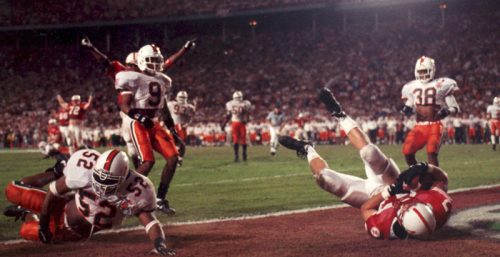
Excerpted from Chapter 95, No Place Like Nebraska: Anatomy of an Era, Vol. 2 by Paul Koch
…So please, be tolerant of those who describe a sporting moment as their best ever. We do not lack imagination, nor have we had sad and barren lives; it is just that real life is paler, duller, and contains less potential for unexpected delirium.
-Nick Hornby, Fever Pitch
I’ve done a fair share of traveling in my time, and a few of the finer outdoor experiences took place in the great state of Montana: Big Sky Country, where the little dipper in the crisp summer night sky gives the impression that it could easily lean down from it’s heavenly perch and jab you right smack in the nose, were it so inclined. Looking skyward from a mountain meadow the universe seemingly presses down on you, smothering and engulfing, turning you into a neo-claustrophobe.
But there are riches underfoot, also, in this old mining country. One jewel of a young man who Coach Dan Young gleaned from the copper-heavy Montana ore went by the name of Mark Gilman. Embracing the pressure, the urgency, the once-in-a-lifetime opportunity to shine and shimmer under the lights, he showed up in a big way on college football’s center stage in the ’95 Orange Bowl.
Sometimes life can be distilled down into one action, one choice, one grand, defining glimpse of grasping for that brass ring, and Mark’s high time was a Miami end zone where anxieties flowed and hopes ebbed. Clutching immortality in his lurching fall across a Miami goal line, his catch of a second quarter Brook Berringer 19 yard pass served notice that something was in the air that night, and a pantheon of Husker stars were born. Let’s hear from the former captain now: tight end Mark Gilman, a man living life with no regrets.
Notable quote #1:
“Before games he’d go through special teams just to remind us on punt team, kickoff team, he’d always say, “You are going to play well today.” I remember, that’s always one of those things that stands out. He was, “You are prepared and you will play well.“ And that meant a ton.”
Mark Gilman
Scholarship recruit, Tight End, Kalispell, Montana (Flathead)
Where are they now? Kalispell, Montana, Information Technology
Question: Hey Mark, so you’re back in Montana. What are you doing?
Mark Gilman: I’m in IT right now. Information Technology as the Manager of Software Quality Assurance. My company works for the National Flood Insurance Program and we service the government with their flood insurance, so I manage a team of seven people and whenever we make changes to our system in any way we test it to make sure when it goes live to our thousands of clients that they don’t have any issues or problems doing business.
For six years previous I worked as an insurance agent in Hastings, Nebraska, and I think one of the natural transitions that we’ll probably talk about here, as far as the lessons learned, is how you can translate playing into the business world. And especially sales, because you might find a lot of the ex-players are in sales. That’s what I’m doing now.
Q: So you’re married with children. Where did you meet your wife?
MG: Actually, the first time I met her was after a two-a-day practice my redshirt freshman year, right on the football field. I met her right after practice and was a sweaty mess… and she was still interested. So that’s good. (laughs)
Q: What was she doing on the field after practice?
MG: I don’t know how she got down there. It’s interesting, Matt Shaw’s girlfriend at the time was friends with my wife and she thought that we’d be a good match, so she actually set us up. (laughs)
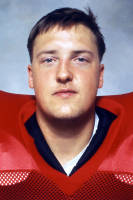
Q: She made a ‘love connection,’ huh? Now, how in the heck did you end up in Lincoln, Nebraska?
MG: This is an interesting story. As you know, schools would assign certain areas of the country to certain coaches to phone and recruit. Well, Dan Young was at that time a kickers coach and did some special teams coaching and also helped on the offensive line. He was quite a character and was assigned to certain states, and one of those states was the state of Montana. And what he would do, recruiting in the state like Montana, he would just create a contact in these rural states like Montana, North Dakota, etc., and the contact he had here was a head coach in Great Falls, Montana by -I believe- the name is Joe Johnson (who’s still coaching, by the way). He’s a well-respected coach who has an unbelievable won/loss record and a lot of state championships.
As I understand it, Coach Young would just call once a year at the beginning part of the recruiting process and say, “Hey, are there any kids in Montana who can play for Nebraska? At this level?” And this is how I understand it, but Coach Johnson gave him my name and another name of a guy who lived in Great Falls who ended up going to the University of Colorado. Which is funny, because I went on the recruiting trip with this kid -whose name was Jon Knutson- and on the plane trip to Lincoln he told me that he was going to come to Nebraska with me. Well, come Monday morning I read in the paper that he signed with Colorado, and what I did, I called him up and said, ‘What gives?’ And he said what happened was, when he got home the next day Colorado promised him a starting position and no redshirt year…
Q: Oh, man!
MG: …whereas at Nebraska, Coach Osborne was too honest for that and said, “Hey, you know what? You’re going to come in and you’re going to compete. You’re going to earn your job.”
Anyway, he went to Colorado all four years. He started out with the starting position and he lost the starting position all four years… and we kicked the crap out of him. (laughs) So that’s how I was recruited. And Osborne actually came to my house on one occasion.
And the other thing is, I kind of thought it was an omen, because I was kind of getting recruited by a lot of schools -and more heavily in basketball at first, because I was a very good basketball player- and what sold it for me was when Coach Ron Brown came up and he watched me, in person, play basketball. And in that game I had probably one of the best games of my high school career. And after the game, that’s when they made the scholarship offer to me. I just figured everything kind of fell together there, and I thought it was ironic that Coach Brown came. I had an unbelievable game and that’s when Coach Brown offered me the full ride. Osborne came up after that and reiterated the full ride. And you know what, how do you say ‘no’?
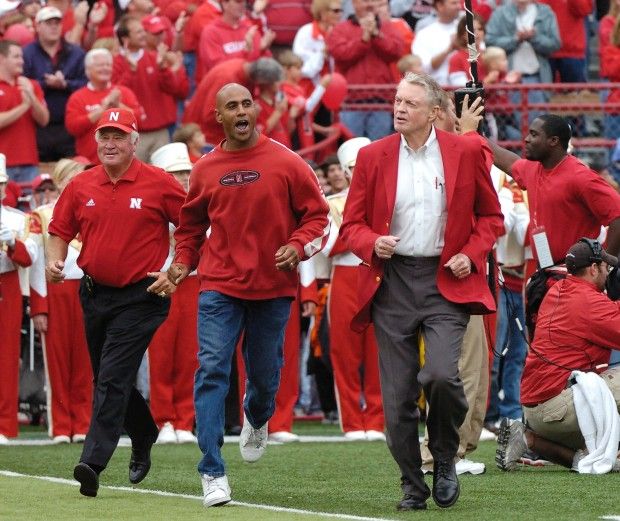
Q: Who else was recruiting you?
MG: At the time it was the Washington Huskies and Washington State, Oregon was starting to heat up a little bit, and Wyoming was very aggressive. And then, of course, the smaller Montana schools were all over me and things like that. But Nebraska, after taking the recruiting trip there, some of the things they were doing, you couldn’t say no to them at the time.
Q: Was there one overriding item that put Husker Football over the top?
MG: Yeah, you know the thing that truly stood out to me? Of course, it was Tom Osborne. Are you kidding me? Here’s a guy who –I understood some things about the man I was talking to at that point in time. And being an eighteen year old -it’s an amazing thing to have a guy of that stature say, “Mark Gilman, I want you to come play for me.”
And you have to understand, we actually had a couple of people who grew up in Nebraska and lived up here in Kalispell, Montana, believe it or not, so I’d become familiar with Tom Osborne and the way he was looked at, how he was perceived and respected. And all of a sudden here’s the guy offering me a scholarship and saying, “Come on down here and let’s go do this.” That’s pretty impressive. At the time I was being recruited by those other schools -and Washington was impressive- but still, something about Nebraska just felt right. It felt right.
And then Ron Brown, also. I could tell right away. I could tell right away Ron Brown was going to get a lot out of me just by the way that he spoke, by the way that he conducted himself, his demeanor. And I knew that was someone who I could play for, because he was the guy who was going to be my position coach.
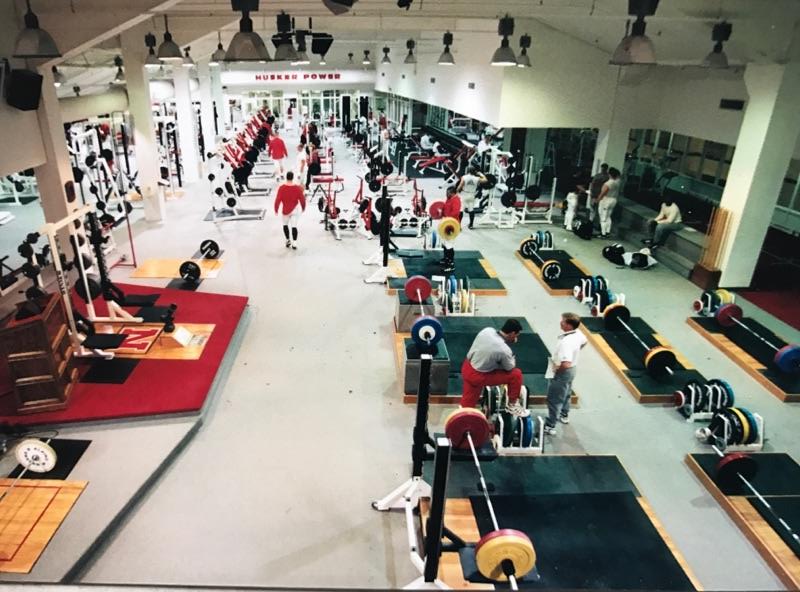
The old West Stadium Strength Complex, circa 1995
And you have to remember, at that point in time Nebraska had placed some emphasis on their facilities, so it was a combination of Osborne and Ron Brown, of course. And then, I’ve got to tell you, I walked into the weight room -and I’d had an interest in becoming bigger, faster & stronger- and then I saw that weight room and my jaw dropped! (laughs) And I’m like, “I could probably get busy in this place right here.”
And that sealed the deal, because I remember Boyd Epley brought me up and he got this computer program out and he said, “Alright, here’s how big you are now and here’s what we’re going to do to you: you’re gonna weigh 255 and you’re going to run a 4.4…” I was all excited. So that was kind of one of my adolescent things, “Oh boy, I can’t wait to be that big and fast.” But mostly, how can you say no to Tom Osborne?
Q: Did your parents come with you on the recruiting trip?
MG: No, they didn’t. My family is notoriously not travelers. I went alone, by myself. But I did hook up and come with that John Knudson from Great Falls, so we did that recruiting trip together. He walked away saying, “I’m coming there with you.” So he was a good friend of mine and I was like, ‘Great, I’m going to be coming in with my good buddy, John.’ And then he ends up becoming a Buffalo. Geez, what an idiot, huh? (laughs)
Q: How far is Kalispell from Great Falls?
MG: Geez, it’s four or five hours. It’s pretty close. That’s “Montana close.”

Q: So you came from some mountain state roots and a hardiness to harsh weather. Did you sense anything different or peculiar in the Nebraska people, the fans, upon entering the University?
MG: That’s a good question. I didn’t see a lot of differences. The mentality of people? It’s just knowing the value of hard work. Montana is Montana, and I want to classify them correctly: I want to say they are hard-working folks. We’ve still got the farms up here -we have the office buildings, too- but the bottom line is, we’ve got people up here who believe in working hard. But going to Nebraska and seeing the transition to the people and the personalities and their beliefs, there wasn’t a lot of difference.
I love Nebraska people -especially in the smaller towns- who are just hard-working folk who put in a tough day of work and know the meaning of ‘work ethic.’ I see a lot of similarities between Montana and Nebraska, I really do.
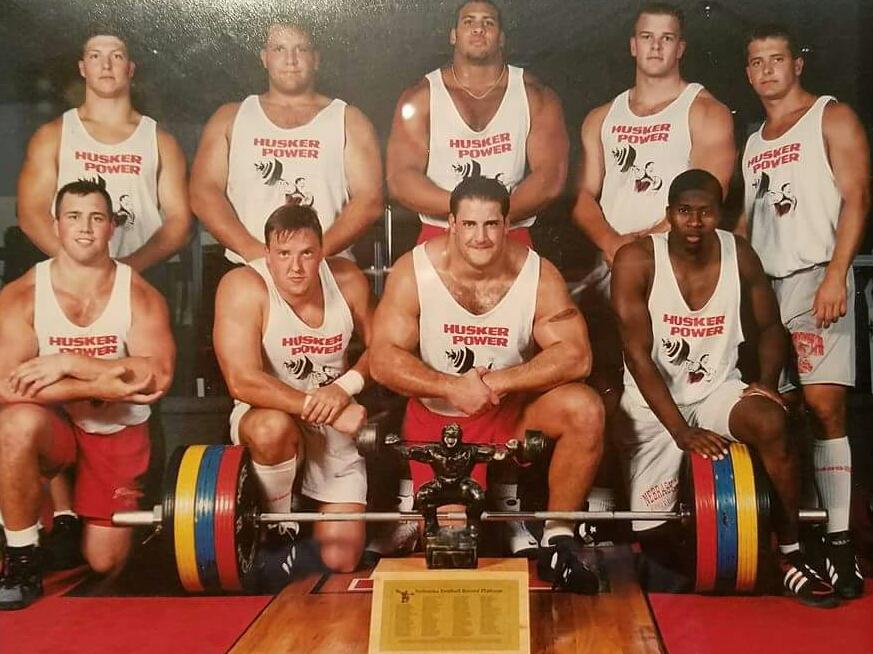
Q: What did your parents do for a living?
MG: My father was a teacher and coach. He coached all sports and taught history, education and health, and my mother was an English teacher, so I got a lot of the coaching directly from my dad and a lot of the psychological preparation to be the best. I was very fortunate, and the most fortunate thing was that I grew up a block from where my dad worked, so I had a key to that gym.
Q: You were a gym rat!
MG: I swear to this day that’s where I developed my athletic ability. I swear going down to that gym and shooting baskets and playing basketball every day, it was the key to all athletic successes.
Q: A key much like Nebraska’s success: repetition, repetition, repetition?
MG: Exactly. Over and over again. Exactly.
Q: So it wasn’t a huge culture shock from an athletic or a personal standpoint to make the move to Lincoln?
MG: No, no. Not much of a culture shock at all.
Q: So you stepped onto campus and two-a-days started. Was there anything about the organization that stood out to you?
MG: I’ve got to tell you, it was a transition for me. One of the bad things about growing up in Kalispell, Montana was that I was a big fish in a small pond, and all of a sudden I’m a small fish in big pond. And the big pond was the Nebraska football program.
This was above my wildest dreams. How do you put it into words? It was an incredible eye-opener to me as far as the expectations of an incoming freshman like myself to not only ‘get it’ from the very beginning, but to be thrown into the fire from the very beginning. As I was going through it it was incredibly difficult, because you were thrown into the fire and there were huge expectations, and you had to learn by trial and error and by the school of hard knocks. (laughs)
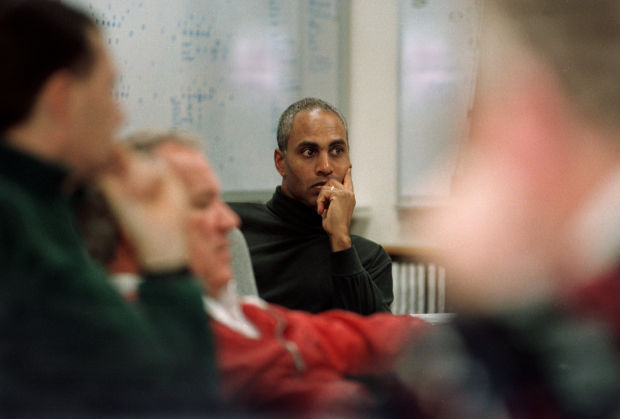
There was obviously Ron Brown, who would sit you down and try to help you and give you a kind word, but I tell you what, it was ‘on’. Nebraska was into the philosophy of up-tempo style, repetition, rotate in and rotate out and ‘get it on.’ So the thing that stood out to me was that everything moved so fast. So fast! And I don’t think it was intense as being ‘either get it or you’re going to be left behind and you’re gone.” I don’t want to put it into that category, but it was close. (laughs)
Q: When was your first fall there?
MG: It was 1991.
Q: So you probably had Will Washington, Johnny Mitchell, Chris Garrett around as the upperclassmen. Were those guys around?
MG: Those were the guys, and Darryl Leise from Creighton Prep. And Johnny Mitchell, wow!
Q: What about Coach Brown’s methods, philosophy?
MG: Here is Coach Brown to a ‘T’: it didn’t matter if it was Monday practice or sixty minutes before the national championship game versus Miami or Florida, he was intense. And it was constant, continuous improvement and challenging us at every moment to be better and to feel the pressure and intensity that it takes to be a champion at all times. I would walk out of Monday meetings ready to take on the world. And that was Coach Ron Brown. And for the five years I was there -because I redshirted- he never let up. Never! And that’s what I tell people all the time about him. There was no difference between him on a Monday in the middle of the season and that freaking championship game; that guy was ready to rock.
Q: And he probably could have played if you let him?
MG: He probably could have played a little bit. He was intense. One of the things, too, what I liked about that -he would put the pressure on you and the intensity on you and the sense of urgency. And that was the phrase that he used, if I recall, ‘Sense of urgency.’ And when it came to game time you wouldn’t melt under pressure. Because, you know, it’s real easy to take it easy all week and philosophize, but he was, “Hey guys, let’s go out and get them today. There are 76,000 fans screaming and you’re down by a touchdown and you have twenty seconds left…” He prepared you for that so you were mentally ready for those situations where there was pressure. He was constant with it.
I do a lot of volunteer coaching and I’ve taken Coach Ron Brown’s philosophy. I try to put enough sense of urgency into my son during the practice to where the game becomes easy, like a break.
Q: How do you find yourself actually doing that?
MG: I do it the way Ron Brown did it. When practice starts I just start hollering and hollering. (laughs) And it’s the whole team: if they go to shoot a free throw at the end of practice I go up and I say, ‘Hey, you’re down by one. You have to no time on the clock. You have two free throws. Are you going to make it?’ This was Ron Brown and this was the way he approached it. I’ve got to tell you, games were a break! (laughs)
Q: Others have said the same thing, “No disrespect to the teams we played, but Saturday was like playing with your kids, like a vacation.”
MG: It was a break, man. It was a break! And one thing you’ve got to remember, Paul, while I was there we had some great defensive players. I mean, I looked down the roster. I found myself looking down the roster about a year ago, and of the twenty-two starters –the starters and their backups, like my senor year- if I got my numbers right eighteen of them played significant years in the NFL. And I’m going against these guys daily in practice, full speed. Are you kidding me? And then you get in the game…? (laughs)

Available on Amazon.com
Q: Exactly. So who did you have to deal with most of those practice sessions?
MG: The rush ends on a daily basis: Trev Alberts, Grant Wistrom, Jared Tomich, Michael Rucker, Travis Hill my first year. Donta Jones. Dwayne-freaking-Harris. This kid scared me. He still scares me. These are the guys I’m dealing with on a daily basis, one-on-one. And after a while they knew our offense, so they didn’t even give a crap and just came full speed. (laughs) Luther Hardin? I mean the list goes on and on, man.
Q: Coach Osborne, did you have any particularly unique interactions with him?
MG: Coach Osborne, you have your biological father and then you probably have some men who you meet along your life who have a fatherly influence on you, as far as teaching you life lessons. My own father, and then you had Ron Brown, and Coach Osborne would have to have been number three. You learned more.
I think Osborne’s real famous for emphasizing more than just football: it was academics, your spiritual life, doing things the right way, emphasizing life after football. He emphasized how to act on the field, off the field. He wasn’t just all about the x’s and o’s and about football and, “Hey, we’ve got to beat Colorado this week.” That’s the thing about Osborne that was very interesting: just like Ron Brown pushing that sense of urgency, Osborne was almost the exact opposite and had a calming effect, an even-keeled demeanor, but oozing with confidence, you know what I mean? That’s what I liked about Osborne. Here’s a guy who didn’t have to yell, didn’t have to jump up and down, but you could tell this guy knew what he was doing. When he said something you knew it meant something, it was just amazing.
You think of a lot of football coaches and they’re fire & brimstone, “Football’s going to war, man!” And ol’ Osborne, before games he’d go through special teams just to remind us on punt team, kickoff team, he’d always say, “You are going to play well today.” I remember, that’s always one of those things that stands out. He was, “You are prepared and you will play well.“ And that meant a ton.
And he would say it with such confidence. Basically, what he was saying was, “You are ready. You are ready and you are prepared.” And one of the things that helped him was that he had already had his legacy established by the time I was there (because new coaches have to establish a legacy with the way that they are, because you could be an easy-going guy like Coach but not have much of a winning record and people won’t think much of you). But with his legacy, when a guy like Tom Osborne says, “Men, you are prepared for anything they throw at you. You will be able to counter whatever they throw at you. You are going to play well,” that means a lot.
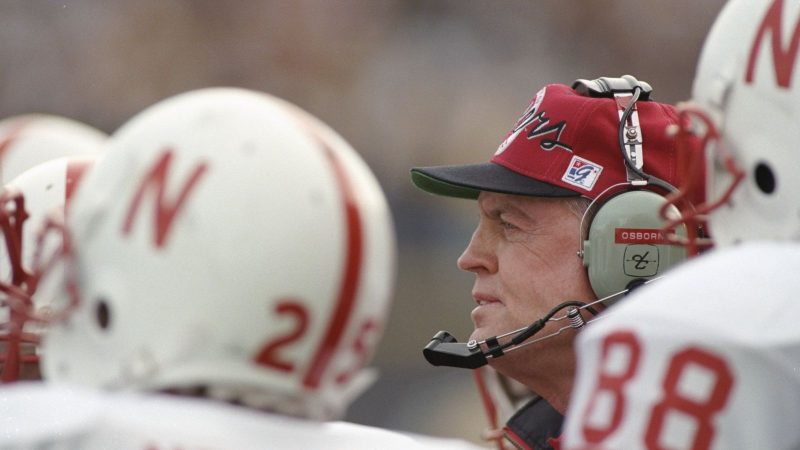
Q: He was planting positive little seeds of proficiency in your heads, huh?
MG: Yeah, and coming from him it was the deal. It was the deal! You can get a coach who comes in and breaks a chair and punches a locker, but man, if you don’t respect a guy? ‘Okay, great.’ He didn’t have to throw a chair of punch a locker, he could just calmly deliver words. And you’d be like, “Oh, it’s on!” (laughs) It’s on!”
To be continued….
Copyright @ 2013 Thermopylae Press. All Rights Reserved.
Photo Credits : Unknown Original Sources/Updates Welcomed
Author assumes no responsibility for interviewee errors or misstatements of fact.